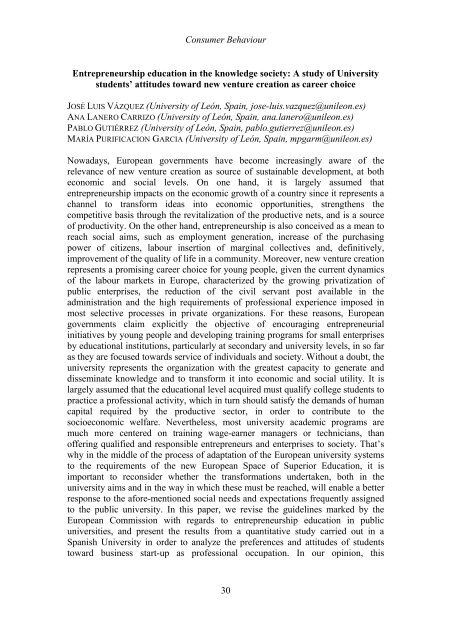Challenges for Analysis of the Economy, the Businesses, and Social ...
Challenges for Analysis of the Economy, the Businesses, and Social ...
Challenges for Analysis of the Economy, the Businesses, and Social ...
Create successful ePaper yourself
Turn your PDF publications into a flip-book with our unique Google optimized e-Paper software.
Consumer Behaviour<br />
Entrepreneurship education in <strong>the</strong> knowledge society: A study <strong>of</strong> University<br />
students’ attitudes toward new venture creation as career choice<br />
JOSÉ LUIS VÁZQUEZ (University <strong>of</strong> León, Spain, jose-luis.vazquez@unileon.es)<br />
ANA LANERO CARRIZO (University <strong>of</strong> León, Spain, ana.lanero@unileon.es)<br />
PABLO GUTIÉRREZ (University <strong>of</strong> León, Spain, pablo.gutierrez@unileon.es)<br />
MARÍA PURIFICACION GARCIA (University <strong>of</strong> León, Spain, mpgarm@unileon.es)<br />
Nowadays, European governments have become increasingly aware <strong>of</strong> <strong>the</strong><br />
relevance <strong>of</strong> new venture creation as source <strong>of</strong> sustainable development, at both<br />
economic <strong>and</strong> social levels. On one h<strong>and</strong>, it is largely assumed that<br />
entrepreneurship impacts on <strong>the</strong> economic growth <strong>of</strong> a country since it represents a<br />
channel to trans<strong>for</strong>m ideas into economic opportunities, streng<strong>the</strong>ns <strong>the</strong><br />
competitive basis through <strong>the</strong> revitalization <strong>of</strong> <strong>the</strong> productive nets, <strong>and</strong> is a source<br />
<strong>of</strong> productivity. On <strong>the</strong> o<strong>the</strong>r h<strong>and</strong>, entrepreneurship is also conceived as a mean to<br />
reach social aims, such as employment generation, increase <strong>of</strong> <strong>the</strong> purchasing<br />
power <strong>of</strong> citizens, labour insertion <strong>of</strong> marginal collectives <strong>and</strong>, definitively,<br />
improvement <strong>of</strong> <strong>the</strong> quality <strong>of</strong> life in a community. Moreover, new venture creation<br />
represents a promising career choice <strong>for</strong> young people, given <strong>the</strong> current dynamics<br />
<strong>of</strong> <strong>the</strong> labour markets in Europe, characterized by <strong>the</strong> growing privatization <strong>of</strong><br />
public enterprises, <strong>the</strong> reduction <strong>of</strong> <strong>the</strong> civil servant post available in <strong>the</strong><br />
administration <strong>and</strong> <strong>the</strong> high requirements <strong>of</strong> pr<strong>of</strong>essional experience imposed in<br />
most selective processes in private organizations. For <strong>the</strong>se reasons, European<br />
governments claim explicitly <strong>the</strong> objective <strong>of</strong> encouraging entrepreneurial<br />
initiatives by young people <strong>and</strong> developing training programs <strong>for</strong> small enterprises<br />
by educational institutions, particularly at secondary <strong>and</strong> university levels, in so far<br />
as <strong>the</strong>y are focused towards service <strong>of</strong> individuals <strong>and</strong> society. Without a doubt, <strong>the</strong><br />
university represents <strong>the</strong> organization with <strong>the</strong> greatest capacity to generate <strong>and</strong><br />
disseminate knowledge <strong>and</strong> to trans<strong>for</strong>m it into economic <strong>and</strong> social utility. It is<br />
largely assumed that <strong>the</strong> educational level acquired must qualify college students to<br />
practice a pr<strong>of</strong>essional activity, which in turn should satisfy <strong>the</strong> dem<strong>and</strong>s <strong>of</strong> human<br />
capital required by <strong>the</strong> productive sector, in order to contribute to <strong>the</strong><br />
socioeconomic welfare. Never<strong>the</strong>less, most university academic programs are<br />
much more centered on training wage-earner managers or technicians, than<br />
<strong>of</strong>fering qualified <strong>and</strong> responsible entrepreneurs <strong>and</strong> enterprises to society. That’s<br />
why in <strong>the</strong> middle <strong>of</strong> <strong>the</strong> process <strong>of</strong> adaptation <strong>of</strong> <strong>the</strong> European university systems<br />
to <strong>the</strong> requirements <strong>of</strong> <strong>the</strong> new European Space <strong>of</strong> Superior Education, it is<br />
important to reconsider whe<strong>the</strong>r <strong>the</strong> trans<strong>for</strong>mations undertaken, both in <strong>the</strong><br />
university aims <strong>and</strong> in <strong>the</strong> way in which <strong>the</strong>se must be reached, will enable a better<br />
response to <strong>the</strong> a<strong>for</strong>e-mentioned social needs <strong>and</strong> expectations frequently assigned<br />
to <strong>the</strong> public university. In this paper, we revise <strong>the</strong> guidelines marked by <strong>the</strong><br />
European Commission with regards to entrepreneurship education in public<br />
universities, <strong>and</strong> present <strong>the</strong> results from a quantitative study carried out in a<br />
Spanish University in order to analyze <strong>the</strong> preferences <strong>and</strong> attitudes <strong>of</strong> students<br />
toward business start-up as pr<strong>of</strong>essional occupation. In our opinion, this<br />
30



